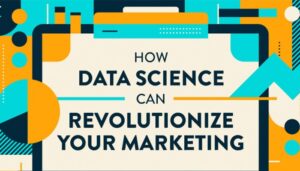Marketing is a field that has undergone a massive transformation in recent years. The rise of the internet and the proliferation of data have given birth to a new discipline: Data Science in Digital marketing.
Data science in marketing is the use of data and statistical techniques to understand and optimise marketing strategies. In this blog, we will explore how data science is changing the face of marketing.
Data science in digital marketing has become a critical component of modern Digital Marketing strategies. With the ability to collect vast amounts of data from multiple sources, marketers can gain deep insights into consumer behaviour, preferences, and trends. By using data science, marketers can develop more targeted and effective campaigns, which can result in higher ROI and better consumer engagement.

Here are some ways in which data science is transforming marketing:
- Personalization: Data Science allows marketers to personalize their messaging and content to each individual customer. By analysing customer data, marketers can understand these preferences and needs, and create personalized campaigns that are more likely to resonate with them. This can result in higher engagement rates, increased loyalty, and higher engagement rates.
- Segmentation: Data science enables marketers to segment their audience into smaller, more targeted groups. By creating smaller segments, marketers can tailor their messaging and content to teach a group’s unique needs and preferences. This can lead to effective campaigns, higher conversion rates, and increased customer satisfaction.
- Predictive Analytics: Predictive Analytics is another powerful tool in data science. By analyzing customer data, marketers can predict future behaviour and preferences. This can help them identify potential opportunities and risks, and adjust their campaigns accordingly. Predictive analytics can also help marketers optimise their marketing spend, by identifying the changes and campaigns that are most likely to drive results.
- Customer Journey Mapping: Data Science can help marketers understand the entire customer journey, from initial awareness to final purchase. By analyzing customer data at each point, marketers can identify areas for improvement and create more effective campaigns. This can result in a smoother customer journey, higher conversion rates, and increased customer loyalty.
Data Science in Marketing
Data Science has had a significant impact on marketing in recent years, as businesses have access to more data than even before, and new technologies have made it easier to collect, store and analyse this data. Here are some ways data science has affected marketing:-
- Improved targeting: data science has made it possible to collect and analyze customer data to create highly targeted and personalized marketing campaigns.
- More accurate measurement: with data science, businesses can measure the effectiveness of their marketing campaigns more accurately. By analyzing data on customer engagement, conversions, and other metrics, businesses can identify which campaigns are working, which are not, and make adjustments accordingly.
- Predictive modelling: Data Science allows businesses to create predictive models that can forecast future trends and behaviours. This can help businesses make more informed decisions about which marketing strategies to pursue and how to allocate resources.
- Automation: Data Science has made it possible you automate many digital marketing processes, from lead generation to customer segmentation to personalized messaging. This helps businesses save time and resources which improves the effectiveness of their marketing efforts.
In conclusion, Data Science is transforming marketing in many more ways. By using data and statistical techniques, marketers can gain deep insights into consumer behaviour, preferences, and trends. This allows them to develop more targeted and effective results resulting in higher ROI and better customer engagement.
As Data Science continues to evolve, we can expect even more innovative marketing strategies that leverage the power of data.
